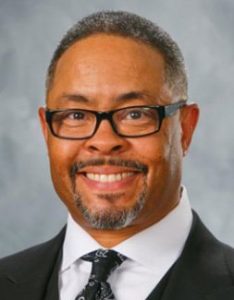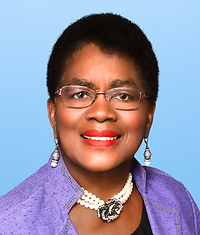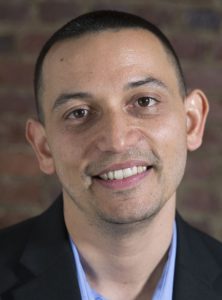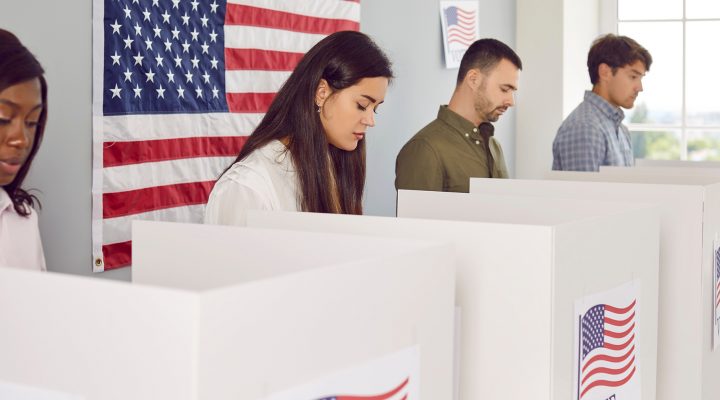An interfaith voter-protection group will station chaplains at polling sites in 10 battleground states to discourage violence and voter suppression efforts during early voting periods and on Election Day.
Faiths United to Save Democracy said it trained 1,400 ordained poll chaplains and lay peacekeepers to help keep the peace at “high-priority” polling locations in Alabama, Arizona, Florida, Georgia, Michigan, North Carolina, Ohio, Pennsylvania, Texas and Wisconsin.

Alyn Waller
The group’s goal is to provide a calming and moral presence to disabled, elderly, youth and other disenfranchised voters through the end of voting on Nov. 5, said Alyn Waller, senior pastor at Enon Tabernacle Baptist Church in Philadelphia and organizer of the poll chaplaincy effort in Pennsylvania.
“We expect our poll chaplains will encounter people who may have had problems at the polls with their voter identification or their names missing from the rolls,” he said. “They have learned what to do if someone runs into an issue with their voting rights and how to de-escalate someone who is upset when something like that has happened to them.”
The volunteers also have been trained as “peace agents” to serve in areas where threats of violence by militia and other anti-democracy groups have been especially prevalent, Waller added. “We are concerned that some intend to carry out all sorts of January 6-type foolishness, so we trained our poll chaplains in de-escalation tactics to help prevent or mitigate those types of things and to encourage voter participation.”
Volunteer chaplains and peacekeepers also were instructed on a “theology of democracy” underscoring the connection between faith and civic engagement. “We want people to understand that it is the responsibility of people of faith to vote, to pray for those who hold office, to respect the rule of law and to respect the process of democracy. This is a specifically multi-faith, multi-racial and multi-generational experience,” he said.
Chaplains from across the spectrum of belief were recruited to promote the message that all people are created in the image of God and therefore have the right to participate in open and fair elections, Waller continued. “For us as Christians, that is the gospel. Everything about Jesus is about the restoring of full humanity to people and that’s what we as clergy and chaplains need to be doing — helping people live their best lives.”

Barbara Williams-Skinner
The need for on-site chaplaincy is urgent and all too obvious, said Barbara Williams-Skinner, co-founder of Faiths United to Save Democracy.
“Evil thrives when good people do absolutely nothing. We don’t have to look any further than the 2016 election as an example of what unregistered and unengaged voters can do to change an election,” she said in reference to the 40% of eligible voters who did not cast ballots in the contest between Donald Trump and Hillary Clinton.
Because ignoring voter apathy is a win for the opponents of constitutional democracy, the organization has engaged young and unregistered voters. “This 2024 presidential election will be a test of our democracy and our faith, which is why early planning and even more robust strategic engagement by the faith community is critical.”
Last year, the Faiths United movement published “Voter Tool Kit: How to Prepare Your House of Worship for the 2024 Election” with support from more than 30 Christian, Jewish and Muslim groups.

Adam Russell Taylor
The kit included a four-phase campaign beginning with webinars on voting rights during the fall and winter of 2023, meetings between local elections officials and faith leaders through April 2024 and youth mobilization and chaplain recruitment and training from May to September. The final phase includes deploying poll chaplains to their voting sites.
“Our vote is our voice,” said Sojourners President Adam Russell Taylor, a core team member with the multi-faith organization. “By voting, we are electing officials that represent the issues we care about. Our vote matters because we have the opportunity to change laws and policies that will benefit our communities. Our vote is our power. We have the power to leverage our votes and hold elected officials accountable to our values and priorities.”
People of faith must show up at the polls to promote justice and compassion and to protect the democratic process, said Sojourners founder Jim Wallis, director of the Georgetown University Center on Faith and Justice and an organizer of the Faiths United effort.
“We must pick leaders who honor the Imago Dei — the image of God in all people — and treat others as they want to be treated. We must pick leaders who are committed to building a more just and inclusive multi-racial democracy,” he said.


